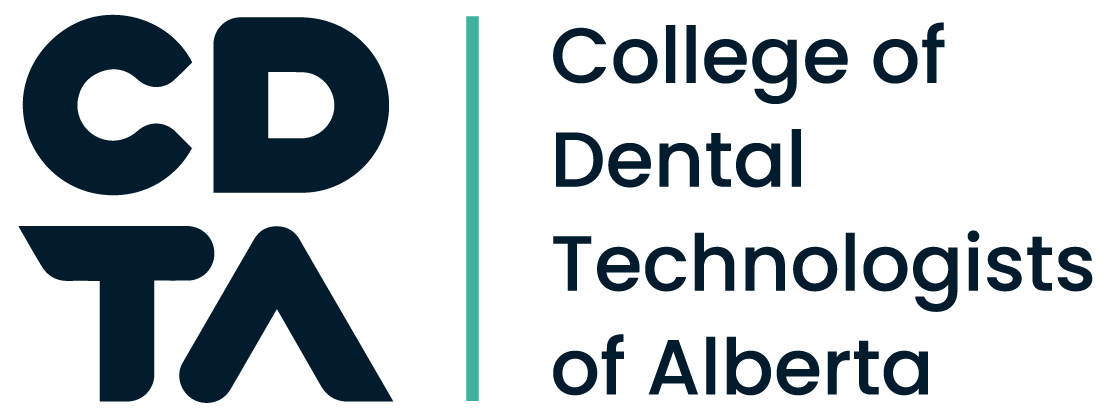Registration and Renewal
Fees Explained
The College of Dental Technologists of Alberta (CDTA) is a regulatory organization responsible for overseeing and directing the practice of Dental Technologists and Dental Technicians to ensure Albertans receive sale, competence, and ethical health care.
The CDTA operates under the Alberta Health Professions Act and is funded through fees from their regulated members (registrants.)
How are Fees Determined?
The CDTA strives to minimize the impact of fees on registrants, setting them only as high as necessary to cover operating costs and meet our regulatory responsibilities and government requirements.
Fees are not set based on profit or market-driven factors such as registrants’ average income or scope of practice. Instead, the CDTA operates on a cost-recovery basis each year.
Financial oversight is provided by the CDTA’s Finance Committee, which always includes at least two registrants to ensure their perspective is represented. The Committee reviews each annual budget in detail and makes recommendations to Council regarding both the operating budget and fees.
The CDTA Council reviews these recommendations alongside other relevant information, such as strategic planning priorities, and makes the final decisions.
What Other Factors Affect Fees?
Because fees are based on the operational needs of the organization, they are influenced by any factors that have affected the total funds collected and the costs associated with fulfilling our regulatory responsibilities in recent years.
Total Number of Registrants
Every health regulatory College in Alberta, regardless of its size, is required to meet the same responsibilities and obligations under the Health Professions Act. Larger Colleges, with thousands of members, can spread operating costs across a broader base, which helps reduce the fee burden on each individual member.
The more regulated member a College has, the more fees that are collected and the easier it is to meet operational budgets.
The CDTA currently has just over 470 registrants making it one of the smallest health profession regulatory colleges in Alberta. As a result, we’re not able to spread costs out like larger colleges that have thousands of registrants.
Complaints and Discipline
Handling public complaints is one of the CDTA’s most important responsibilities, but it can also be one of the most costly. Complaints often involve detailed investigations, expert reviews, and legal processes, all of which require significant time and resources.
While a regulatory college can recover some of these costs through fees or penalties, there are strict limitations on how much a college can recover. This usually results in over half of complaints-related expenses coming from CDTA operating funds.
When registrants proactively comply with regulatory requirements and adhere to professional standards and ethics, there are fewer complaints filed, which helps reduce costs for the entire profession.
Professional Liability Insurance
For all health-related professionals, Professional Liability Insurance (PLI) is important for protecting the public from the financial burdens that can occur in cases of alleged negligence.
While some regulators require each professional to purchase their own PLI, the CDTA has made PLI coverage automatic for all registrants and integrated the costs into their annual feeds.
This ensures that all registrants consistently maintain the required coverage to safeguard Albertans.
Regulatory Compliance
The CDTA is responsible for ensuring registrants meet all their regulatory responsibilities, including renewing their practice permits on time and keeping up with the Continuing Competence Program (CCP).
CDTA has limited staff to help keep operating costs small. This means tasks like checks, audits, reminders, and follow-ups can use up resources quickly when there are missed deadlines or delays in resolving compliance issues.
When overall compliance with regulatory requirements is lower, the CDTA needs to spend more time and resources on reminders, monitoring, and follow-up. This extra workload increases expenses, which ultimately impacts fees.
Reserve Fund
It’s important for organizations like the CDTA to maintain a reserve fund to ensure we continue to meet our responsibilities in the event of unplanned expenses or a sudden rise in costs.
The CDTA’s Council is responsible for setting the reserve target to make sure the organization remains sustainable. At present, the CDTA is meeting this target.
Strategy and Operations
The CDTA’s finances are reviewed every year by independent auditors. The results are both filed with the government and made publicly available in our annual reports. You can access these reports at any time on our website: CDTA Annual Reports.
In addition to detailed financial statements and auditor’s notes, the Annual Reports also include information about registration statistics, complaints investigations, and Council decisions.
2026 Registration & Renewal Fees
Description |
Fee (CAD) |
| REGISTRATION FEES |
|
| Initial Application6 |
$250.00 |
| Reinstatement1 |
$880.00 |
| Reactivation2 |
$250.00 |
| Restricted Activities Authorization3 |
$85.00 |
| PRACTICE PERMIT 20264 |
|
| January 1 - June 30 |
$880.00 |
| July 1 - December 315 |
$440.00 |
| Late Renewal (November 30 - December 31) |
$200.00 |
| REFUNDS (Annual Practice Permit Fees Only) |
|
| Before January 31 |
75% of annual practice permit fee |
| Before June 30 |
50% of annual practice permit fee |
| After July 1 |
No Refund |
- individuals who are not cancelled in good standing are subject to the reinstatement fee (no statutory declaration competed per s 4.13.3 of the CDTA Bylaws)
- individuals who are cancelled in good standing are subject to the reactivation fee (statutory declaration competed per s 4.13.3 of the CDTA Bylaws)
- Fee is in addition to the annual practice permit fee for additional errors and omissions insurance
- Applies January 1 – December 31 for full and temporary-conditional members
- Fees for individuals engaged in the unregulated practice of dental technology will not be pro-rated
- Initial application fees will be waived for educational student members
Access the full 2026 Fee Schedule
2025 Registration and Renewal Fees
